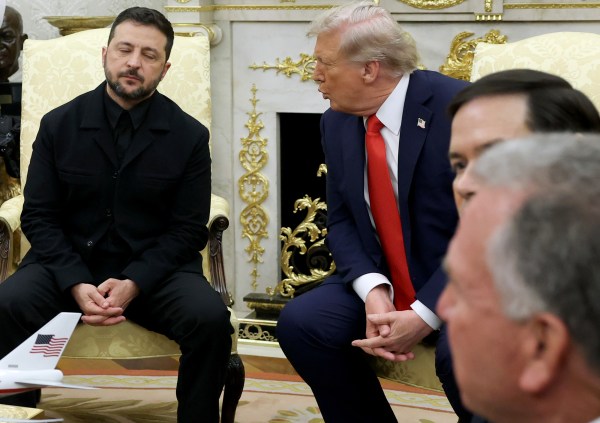In the span of three hours yesterday, I went from planning a newsletter about a U.S. senator getting tackled after confronting the secretary of homeland security to planning a newsletter about a constitutional crisis over command of the California National Guard to planning a newsletter about war erupting in the Middle East.
Whatever else one might say about the end of American empire, it ain’t boring.
As news circulated about the stupendous success of Israel’s attack on Iran, my first thought was that if you told me Mossad had figured out a way to part the Red Sea, at this point I’d believe you. The feats of intelligence and ingenuity that Israel has managed over the past year at the expense of Iran and its proxies would seem far-fetched as fiction, but here we are. It’s reassuring to see a Western nation demonstrate such competence as the United States descends into malevolent dark-age populist anarchy.
My second thought was that the October 7 pogrom perpetrated by Hamas must be one of the worst military miscalculations since Pearl Harbor. Less than two years later, the group’s leadership is dead and Gaza is in ruins. Hezbollah, Iran’s most dangerous proxy, has been decapitated and left so enfeebled that it’s already bowed out of the conflict that began last night. Iran itself appears defenseless against Israeli airstrikes, has seen its main uranium enrichment facility go up in flames, and lost its military chief of staff, its Revolutionary Guard commander, and its lead nuclear negotiator in a single evening.
I don’t know how Tehran’s brain trust imagined all of this ending when the latest intifada was launched, but in June 2025 it’s suddenly an open question whether any of them will be alive in a week.
Then came a third thought: Was all of this a hoax?
By “all of this,” I mean Donald Trump’s outreach to Iran. He’s been negotiating with them for weeks over their enrichment program with the next round of talks scheduled for Sunday. The conventional wisdom, which seemed persuasive, was that the recent warnings about an imminent Israeli attack were part of a “good cop, bad cop” routine aimed at pressuring the regime into concessions. Either the Iranians would make a deal this weekend with good cop Trump or bad cop Benjamin Netanyahu would get to do things his way.
Then, last night, before the good cop had his chance, the bad cop took out his baton and started swinging. Huh?
A new theory has emerged today to explain the odd timing: Trump’s talks with Iran were a hoax. The negotiations “ended up being the perfect cover for a surprise Israeli attack,” lulling the Iranians into lowering their guard in the mistaken belief that nothing would happen until after Sunday’s talks at the earliest, the Wall Street Journal alleged. Two Israeli officials told Axios that “Trump and his aides were only pretending to oppose an Israeli attack in public… The goal, they say, was to convince Iran that no attack was imminent and make sure Iranians on Israel’s target list wouldn’t move to new locations.”
Donald Trump, tactical genius?
I’m skeptical, but the possibility is worth considering, as is the reaction among his base. If it’s true that the president helped facilitate an Israeli sneak attack on Iran, what’s a loyal “America Firster” to do?
Saving face.
The problem with the “hoax” theory is that the Israeli and U.S. governments each have reason to promote it even if it isn’t true.
Imagine that it isn’t. Assume that the president sternly and earnestly warned Netanyahu not to attack until his big, beautiful negotiations with Iran were dead. (“As long as I think there is an agreement, I don’t want them going in because that would blow it,” Trump told reporters on Thursday.) Assume further that the prime minister concluded that he’d be a fool to heed that warning, having been presented with a golden opportunity to catch the Iranians off guard, and gave the order to go ahead.
If you were Netanyahu, having just flagrantly defied your American patron and blown up his dream of detente with Tehran (literally!), what would you say the next day? Would you dare embarrass the president by informing the world that he opposed the strikes, calling his nerve, his judgment, and his influence over his closest allies into question?
Or would you graciously include him in your victory lap following a spectacular military achievement by spreading a lie that he was in on it from the start?
The same logic applies from Trump’s perspective. Whether to denounce Israel for attacking against his wishes or to denounce Iran for refusing to make a deal against his wishes should depend almost entirely on whether the attack succeeded or not. That’s especially true for a guy who likes to associate with “winners,” enough so that he’s not above changing his views retroactively about whether a war was justified based on how it’s going. And Israel sure looks like a winner after day one of its campaign.
Maybe the president really was part of an ingenious Israeli subterfuge. Or maybe he’s celebrating the attack today simply to seize the opening Netanyahu created for him to save face.
It’s easy to see why Israel’s high command might have chosen to ignore any instructions from the White House to delay its battle plan. The strategic stars for an attack had aligned. Iran’s air defenses were weak thanks to Israel’s strikes last year, although not for much longer; its proxies, Hamas and Hezbollah, are out of commission at the moment; and lord only knows what sort of half-assed deal Trump might have struck this weekend in the name of averting regional war.
Even if you doubt Israel’s claim that Iran was days away from producing enough weapons-grade uranium for 15 atomic bombs, there is reason to believe that the regime’s capabilities were accelerating. Which makes sense: Having lost all of their traditional military leverage over the last 20 months, Iran’s leaders might have decided to fill the vacuum by going for broke with nukes. Dragging out talks with Trump may have been a ploy to buy time while that project advanced surreptitiously, premised on the belief that Israel wouldn’t dare attack so long as the president was in hot pursuit of an agreement.
If so, it worked! Until it didn’t. Perhaps Iran really had at last gotten close enough after years of progress that the Israelis couldn’t wait.
As for the idea that the president knew all along what was coming and participated in a clever ruse to deceive the Iranians, the problem with believing that he’s a tactical genius is that he’s not a tactical genius.
A tactical genius wouldn’t start a trade war with the entire planet and then walk it back a week later upon discovering that doing so had economic consequences. A tactical genius wouldn’t support sweeping arrests of illegal immigrants at American businesses only to suddenly retreat when it dawned on him that that too might cause certain disruptions.
Treating negotiations with rogue powers as a cover for military action would also be wildly out of character for Trump. He really does believe that he’s a master negotiator capable of charming the world’s most dangerous lunatics into befriending America. As a candidate last year, he boasted of having started no new wars during his first term and routinely attacked his hawkish critics as warmongers. Unless I’ve badly misjudged him, it simply would not occur to him to lose faith in his ability to persuade the Iranians to make a deal, and certainly not with new talks scheduled in 72 hours.
As late as Friday morning, hours after Israel’s strikes, he was still calling on Iran to come back to the bargaining table and negotiate. Negotiate over what? Over a nuclear program that may no longer exist? No matter—that’s the art of the deal, baby.
Democratic national security expert Phil Gordon has it right, I suspect. Trump “desperately wanted a deal with Iran and publicly and privately told Israel not to strike. A confident Netanyahu called his bluff, told him Israel needed to act, and Trump felt no choice but to go along,” he speculated. “He now has to act as if this was his call but in so doing finds himself having to defend Israel in a war he did not want but could not prevent.”
As a political matter, though, it doesn’t much matter whether the Iran talks were a hoax or not. Israel acted and Trump is now taking credit, sincerely or not. How are right-wing populists coping with that?
A pickle.
Another thought I had last night was how this is playing out on Earth 2, where Kamala Harris is president. I imagine Donald Trump has briefly interrupted his manic posting about the stolen 2024 election to declare that Israel never would have attacked Iran if he were in charge.
And a lot of MAGA suckers are buying it.
The uncomfortable truth for “America First” nationalists is that a Democratic administration would have stood a better chance of restraining Netanyahu—although only marginally. If I’m right that Israel believed its window to disable Iran’s nukes was narrow, it would have proceeded no matter how any American president felt about it. And to give Harris her due, she sounded some hawkish notes about Iran as a candidate last year. The odds that she would have supported a strike are low but not zero.
What might have given Israel pause about attacking, though, is her base. The left is far more hostile to the Jewish state than the right is, so a preventive war on Iran would have caused more political trouble for a Democratic president than a Republican one. Harris would have been stuck in the same position Trump is now, forced to choose between claiming that she approved of the attack or was insultingly overruled by Netanyahu, and neither would have gone over well with Democrats. Relations between the two countries’ governments would have suffered as her administration struggled to navigate that.
And so maybe, on Earth 2, Israel calculates that attacking Iran would do too much damage to its standing with the ruling party in the United States and chooses not to move forward. Having Trump as president here on Earth 1 solved that problem for them. No Republican president is going to break with Israel over the war, regardless of how he or she might personally feel about it, because GOP sympathy for Israelis runs waaaaaay deeper than Democratic sympathy does.
But that leaves “America Firsters” in a pickle.
If they accept the narrative that Trump cooperated with Israel to hoax Iran, their favorite president is complicit in one of those interminable Middle Eastern wars that wasn’t supposed to happen on his watch. But if they accuse Netanyahu of starting a war against Trump’s wishes that has put U.S. troops at risk of Iranian retaliation, they’re almost certainly pitting themselves against the pro-Israel majority of GOP opinion.
You could hear the gears turning in Charlie Kirk’s head last night as he tried to suss out in real time which side of the fence is safest. “[Y]ou guys … are not thrilled with this situation at all,” he told his fans during a livestream as the bombs fell. Although describing himself as “very pro-Israel,” he felt obliged to wonder, “How does the America First foreign policy doctrine and foreign policy agenda … stay consistent with this right now?”
Other populist “influencers” sounded anti-war by straining to distinguish Israel’s interests from America’s. “Iran does not pose any credible threat to the United States,” The Daily Wire’s Matt Walsh insisted. “We do not need to get involved in yet another war in the Middle East for reasons that have nothing to do with defending our own nation.” One accused Israel of “a blatant attempt to force us into war.” Tucker Carlson, the grande dame of postliberal media, went as far as to urge Trump to “drop Israel. Let them fight their own wars.” A conflict with Iran is simply “not in our national interest,” he insisted.
And then there were the guys who are so far gone as to be pro-war but on Iran’s side, calling on the president to bomb Tel Aviv himself. Those types aren’t respectable enough for Fox News but they are respectable enough for the likes of Tucker and Joe Rogan. And if you don’t think they’re influencing right-wing opinion, especially among the young chuds of the new right, you’re kidding yourself.
What’s interesting about watching nationalists struggle to cope with all this is that, if ever there were a foreign military operation that they should be able to appreciate, Israel taking out Iran’s nuclear program is it.
After all, Iran does pose an obvious “credible threat to the United States” if it develops nuclear weapons. It’s the same threat as North Korea. Once it has the bomb, it has the means to conduct nuclear blackmail; once it has ICBMs, we’re at risk of being blackmailed directly. Its clerical regime has preached “death to America” for decades and has backed it up by killing hundreds of American soldiers in Iraq and beyond. It’s indisputably in our national interest to see Shiite fanatics with an immense body count who despise “the Great Satan” forcibly disarmed. If the U.S. can make that happen at the price of little more than moral support for Israel, a sincere “America Firster” should see the value.
The reason they’re mad isn’t because there’s no national interest at stake. It’s because postliberals yearn to see liberal powers defeated on the battlefield. It’s the same reason they despise Ukraine for doing what any nation, including America, would do if invaded. Authoritarians are keen to discredit liberalism as a weak, failed ideology in order to soften its support in the west. When instead the Ukrainians stick it to fascist Russia and the Israelis humiliate fascist Iran, the sleazy dregs of American populism are embarrassed. It’s a setback for the postliberal project. The fact that Jews are responsible in both cases only makes it worse.
Impotence.
They’re embarrassed by their own impotence too, although they’d never admit it.
Populists thought they were getting a president who’d pressure America’s liberal allies into laying down their arms. Instead they’ve watched Trump flail in trying to end the war in Ukraine and fail in trying to prevent a war on Iran, something they’ve been banging on about for years. Either he’s secretly allied himself with “neocons,” taking nationalist support for granted, or he’s an earnest peacekeeper who’s nonetheless lost so much credibility with foreign leaders that even clients like Netanyahu, never mind adversaries like Vladimir Putin, feel comfortable laughing him off.
These people are the ideological vanguard of the modern right and today they look like schmucks. And they’ll look like even bigger schmucks when the polling on Israel’s strike rolls in and we’re reminded yet again that most Republicans aren’t principled nationalists or “America First” or ideological in any meaningful way. They’re for whatever Trump is for, however smart or stupid that may be, and if Trump is for Israel bombing Iran—at least after the fact—they’ll be for that too.
My best guess is that the president is for and against Thursday’s attack the same way he’s for and against tariffs and for and against rounding up illegal immigrant workers on American farms. Tariffs are good until they threaten to tank the global bond market. ICE raids are good until businesses risk going under from losing a third of their workforce in one afternoon. Nuclear negotiations are good until Israel pulls off the military feat of the century, at which point the negotiations were just a hoax designed to maintain the element of surprise.
It all comes down to outcomes. Trump prefers postliberal policies right up until liberal ones begin to deliver better results, which they usually will. No wonder the Tuckerites are grumpy.









Please note that we at The Dispatch hold ourselves, our work, and our commenters to a higher standard than other places on the internet. We welcome comments that foster genuine debate or discussion—including comments critical of us or our work—but responses that include ad hominem attacks on fellow Dispatch members or are intended to stoke fear and anger may be moderated.
With your membership, you only have the ability to comment on The Morning Dispatch articles. Consider upgrading to join the conversation everywhere.